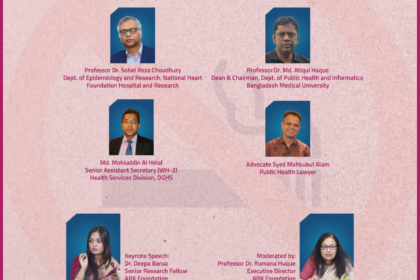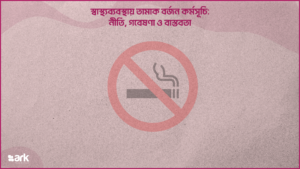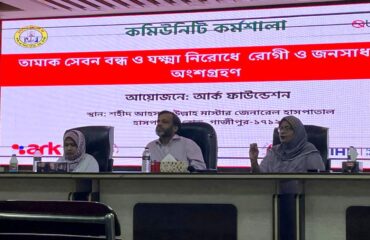
Experts Urge Stronger Tobacco Cessation Services in Bangladesh’s Health System
ARK Foundation hosted a webinar titled “Tobacco Cessation in Health Systems: Policy, Research & Reality”, bringing together experts and participants from academia, advocacy groups, and research organizations, including international researchers. The event explored the status, challenges, and opportunities for integrating tobacco cessation into Bangladesh’s health system, with comparisons to other South Asian countries.
Bangladesh, the first signatory to the WHO Framework Convention on Tobacco Control (FCTC) in 2003, aims to become tobacco-free by 2040. Yet, the country scores low under the “Offer help to quit tobacco use” component of the WHO MPOWER framework. Data from the Global Adult Tobacco Survey 2017 shows that 11.5% of cigarette smokers intend to quit within the next month, 18.5% within a year, and 37.3% someday. Nearly 45% have attempted to quit, but 69.7% tried without assistance, only 10.7% received counseling, and just 0.2% used pharmacotherapy. The remaining 3.3% who have tried quitting tried doing so through traditional therapy or by shifting to Smokeless Tobacco (SLT).
 Additionally, it was also seen that while most of the countries in the South Asian region provide some sort of tobacco cessation support either in the form of counselling through health care workers, implementation of a toll free Quitline, guidelines on tobacco cessation, integration of tobacco dependence cessation within the medical education system and / or availability of Nicotine Replacement Therapy (NRT), these initiatives are yet to be implemented in Bangladesh.
Additionally, it was also seen that while most of the countries in the South Asian region provide some sort of tobacco cessation support either in the form of counselling through health care workers, implementation of a toll free Quitline, guidelines on tobacco cessation, integration of tobacco dependence cessation within the medical education system and / or availability of Nicotine Replacement Therapy (NRT), these initiatives are yet to be implemented in Bangladesh.
Speakers highlighted ongoing initiatives of ARK Foundation, including training primary healthcare providers in brief interventions, integrating cessation into tuberculosis programmes, urban outreach with Dhaka North City Corporation, targeted programmes for pregnant women, children, and religious communities, and the mHealth-based Quit4TB intervention. However, they noted gaps in service availability, guidelines, and integration into healthcare curricula across the region.
Moderated by Professor Dr. Rumana Huque, Executive Director of ARK Foundation, the webinar featured a keynote speech by the organization’s Senior Research Fellow, Dr. Deepa Barua, and included contributions from Dr. Md. Atiqul Haque, Professor, Dean and Chairman of the Department of Public Health & Informatics at Bangladesh Medical University; Advocate Syed Mahbubul Alam, Public Health Lawyer; and Md. Mohiuddin Al Helal, Senior Assistant Secretary (WH-2) at the Health Services Division, DGHS.
The discussion concluded that achieving a tobacco-free Bangladesh by 2040 will require expanding cessation services as part of the Essential Service Package, ensuring public funding, and increasing access to evidence-based counseling and pharmacotherapy.
Media Contact:
Abdullah M. Rafi
Research Uptake & Communication Manager, ARK Foundation
Contact: Email: abdullah.rafi@arkfoundationbd.org




